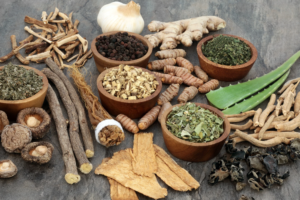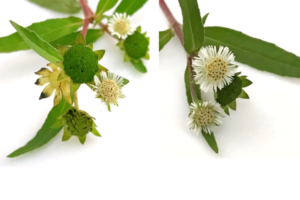Let’s face it: digestive issues are the worst. Whether it’s the bloating that makes you look five months pregnant or the gas that could clear a room, we’ve all been there. But before you reach for the industrial-strength antacids, why not give Mother Nature a chance to heal your gut? In this blog, we’ll explore natural remedies for digestive health, blending humor with herbs to keep your tummy happy and your spirits high.
1. Ginger: The Spicy Saviour

Ever wonder why your grandma swore by ginger tea? It’s because this spicy root is a powerhouse for your digestive system. Ginger can help alleviate nausea, reduce inflammation, and speed up digestion. Plus, it’s an excellent excuse to nibble on ginger cookies (in moderation, of course).
How to use it:
• Brew a cup of ginger tea by steeping fresh ginger slices in hot water.
• Add grated ginger to your soups and stir-fries.
• Chew on a small piece of raw ginger if you’re feeling particularly brave.
2. Peppermint: The Cool Operator

Peppermint is not just for fresh breath. This minty marvel can relax the muscles of your digestive tract, reducing symptoms of IBS and bloating. It’s like a spa day for your stomach, minus the cucumber slices over your eyes.
How to use it:
• Sip on peppermint tea after meals.
• Use peppermint essential oil (diluted with a carrier oil) for a soothing abdominal massage.
• Snack on some peppermint leaves if you’re feeling fancy.
3. Probiotics: The Gut’s Best Friend

Probiotics are the superheroes of the digestive world. These friendly bacteria help maintain a healthy balance in your gut, preventing issues like constipation and diarrhea. Think of them as the bouncers at Club Stomach, keeping the troublemakers at bay.
How to use it:
• Incorporate yogurt, kefir, or sauerkraut into your diet.
• Take a high-quality probiotic supplement (but consult with a healthcare provider first).
• Experiment with other fermented foods like kimchi and miso.
4. Greek Yogurt: The Creamy Crusader

Greek yogurt is more than just a tasty snack; it’s a digestive dynamo. Packed with probiotics, it helps maintain a healthy gut flora, aids digestion, and boosts your immune system. Plus, it’s thick and creamy enough to make you forget you’re eating something healthy.
How to use it:
• Enjoy a bowl of Greek yogurt with honey and fresh fruits for breakfast.
• Add it to smoothies for a probiotic boost.
• Use Greek yogurt as a base for creamy salad dressings and dips.
5. Chamomile: The Gentle Giant

Chamomile is the teddy bear of the herbal world. It’s gentle yet effective at soothing an upset stomach and reducing gas. Plus, it’s a great way to wind down before bed – no more tossing and turning with a tummy in turmoil.
How to use it:
• Enjoy a warm cup of chamomile tea.
• Add dried chamomile flowers to a relaxing bath.
• Use chamomile extract in your cooking for a floral twist.
6. Fiber: The Unsung Hero

Fiber might not be the most glamorous remedy, but it’s crucial for a healthy digestive system. It helps everything move along smoothly, preventing both constipation and diarrhea. Fiber is like the dependable friend who’s always there when you need them.
How to use it:
• Load up on fruits, vegetables, and whole grains.
• Add chia seeds or flaxseeds to your smoothies.
• Snack on nuts and seeds for a fiber boost.
7. Apple Cider Vinegar: The Tart Tonic

Apple cider vinegar (ACV) is the Swiss Army knife of natural remedies. It can help with heartburn, indigestion, and even aid in weight loss. Just remember, a little goes a long way – this stuff is potent!
How to use it:
• Dilute one tablespoon of ACV in a glass of water and drink before meals.
• Use ACV as a salad dressing with olive oil.
• Add a splash to your morning smoothie for a tangy kick.
8. Fennel: The Flavorful Friend

Fennel seeds are a well-known remedy for bloating and gas. They can help relax the muscles in your gastrointestinal tract, making your belly feel like it’s on a tropical vacation.
How to use it:
• Chew on a teaspoon of fennel seeds after meals.
• Brew fennel tea by steeping the seeds in hot water.
• Add fennel to your cooking for a sweet, licorice-like flavor.
9. Cloves: The Tiny Titans

Cloves might be small, but they pack a punch when it comes to digestive health. These tiny titans can help reduce gas, bloating, and indigestion. They also have antimicrobial properties, which can help keep your gut flora in balance.
How to use it:
• Brew clove tea by steeping a few cloves in hot water.
• Add ground cloves to your cooking, especially in dishes like curries and baked goods.
• Chew on a clove after meals to freshen your breath and aid digestion.
What to Avoid: The Culprits of Digestive Distress
While incorporating these natural remedies can significantly improve your digestive health, it’s equally important to avoid foods and habits that can wreak havoc on your gut. Here are some common culprits:
1. Processed Foods
Highly processed foods often contain unhealthy fats, sugars, and artificial additives that can disrupt your digestive system. These foods are typically low in fiber and high in trans fats, which can lead to constipation and other digestive issues.
2. Excessive Sugar and Artificial Sweeteners
Too much sugar can cause an imbalance in your gut bacteria, leading to issues like bloating and gas. Artificial sweeteners, especially sorbitol and xylitol, can have a laxative effect and cause discomfort.
3. Fried and Fatty Foods
Foods that are high in fat can slow down the digestive process, leading to bloating, gas, and discomfort. Greasy, fried foods are particularly problematic as they can irritate the stomach lining.
4. Dairy Products (for the Lactose Intolerant)
If you’re lactose intolerant, consuming dairy can lead to bloating, gas, and diarrhea. Consider lactose-free alternatives or dairy products with live cultures that aid in digestion.
5. Carbonated Beverages
The bubbles in carbonated drinks can cause gas to build up in your stomach, leading to bloating and discomfort. Opt for still water or herbal teas instead.
6. Alcohol
Alcohol can irritate your digestive system and lead to acid reflux, heartburn, and other digestive issues. Drink in moderation and choose beverages that are lower in alcohol content.
7. Caffeine
Caffeine can stimulate the production of stomach acid, leading to acid reflux and heartburn. Limit your intake of coffee, tea, and caffeinated sodas, especially if you’re prone to these issues.
Conclusion
There you have it – nine natural remedies to keep your digestive system running smoothly and a guide on what to avoid to prevent digestive distress. Remember, everyone’s body is different, so what works for one person might not work for another. Give these remedies a try and see what suits your belly best. And most importantly, don’t forget to laugh – after all, a happy gut is a healthy gut!
So next time your stomach’s in a twist, skip the medicine cabinet and head to the pantry instead. Your digestive system will thank you, and you might even discover some new favorite flavors along the way. Cheers to good gut health and good humor!










